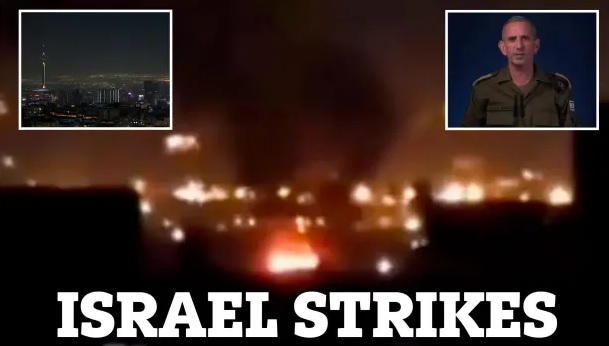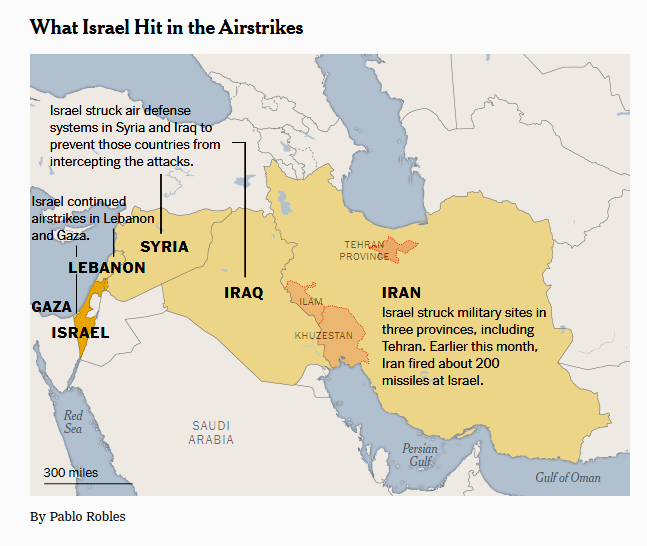
Israel carried out a series of airstrikes against Iran on Saturday, the Israeli military said.
The strikes seen and heard by residents in the capital, Tehran, came weeks after Iran fired waves of ballistic missiles at Israel, forcing millions of Israelis to take cover in bomb shelters. Iran said its attack early this month was in retaliation for Israel’s killing of an Iranian commander and several leaders of Iranian-backed groups in the region, writes ‘The New York Times’.
The recent exchanges of air attacks by Israel and Iran have ruptured their longstanding practice of avoiding direct military clashes.
The Israeli military said in a statement at 2:30 a.m. on Saturday that it was “conducting precise strikes on military targets in Iran,” saying it was acting in response to more than a year of attacks on Israel by Iran and its allies across the Middle East. It was a rare acknowledgment by Israel of military activity on Iranian territory.
Residents of Tehran reported hearing explosions in and around the city. Just after 6 a.m., the military said the strikes had concluded. Israeli officials said the attack was over by about 5 a.m., after 20 targets had been struck.
During an exchange of airstrikes in April, Israel waited only about five days to respond to an Iranian attack similar to Tehran’s Oct. 1 missile barrage.
Various factors seem to have dictated a longer lead-up to a response this time, about 25 days, including talks between Israel and the Biden administration, the arrival of a U.S. air defense system and the Jewish holidays. The coming U.S. election could have also affected Israel’s timing.
In April, Iran launched a barrage of missiles and drones at Israel — its first direct attack on the country — in retaliation for an Israeli strike on an Iranian Embassy compound in Syria’s capital, Damascus, that killed three top Iranian commanders. Israel largely thwarted the Iranian missile barrage using its air defenses, assisted by the United States and other allies, and then responded with an attack of its own.
Then, in late July, Israeli jets killed a top commander of Hezbollah in Lebanon’s capital, Beirut, in retaliation for a rocket attack that killed at least 12 people. One day later, Hamas’s political leader, Ismail Haniyeh, was killed in an explosion in Tehran.
The Iranian government and Hezbollah vowed to retaliate but, to the surprise of many, Iran took no immediate action.
It launched a missile barrage at Israel on Oct. 1, which the country’s Islamic Revolutionary Guards Corps said was in retaliation for the assassinations of Mr. Haniyeh; Hezbollah’s leader, Hassan Nasrallah, late last month; and an Iranian commander.
Israel was trying to balance its strategic goals with concerns from its allies, particularly the United States, that a new attack could set off a wider regional war.

The Israeli government had told the Biden administration that it would avoid striking Iran’s nuclear enrichment and oil production sites, two officials said this month. The officials, who spoke on the condition of anonymity to discuss sensitive diplomacy, said that Israel had agreed to focus its attack on military targets in Iran.
U.S. officials have been concerned about being dragged into a bigger Middle East confrontation with the presidential election less than two weeks away.
In Saturday’s attack, Israel said its warplanes had targeted missile-manufacturing facilities, surface-to-air missile arrays and other military sites. Iran’s national air defense force said Israel had attacked military bases in three Iranian provinces, including Tehran, causing “limited damage.” Iran’s army said that two of its soldiers working in air defense had been killed in the strikes.
A U.S. official said Saturday that Israel had alerted Biden administration officials ahead of the strikes but declined to specify how far in advance.
Some analysts have said that the looming U.S. presidential election and the fact that Mr. Biden is not seeking a second term may have made it harder for the administration to influence and potentially limit Israeli action.
A White House official briefing reporters on Saturday said the administration believed the Israeli attack should be the end of the military exchanges between Israel and Iran, but that the United States would again come to Israel’s defense if Iran retaliates.
read more in our Telegram-channel https://t.me/The_International_Affairs

 10:54 27.10.2024 •
10:54 27.10.2024 •






















